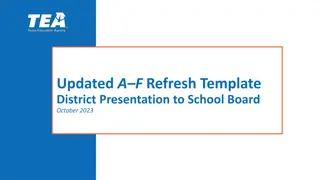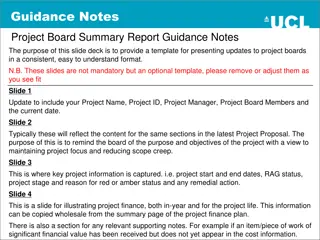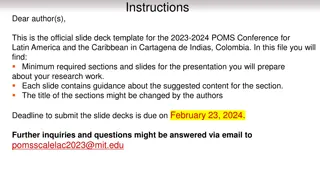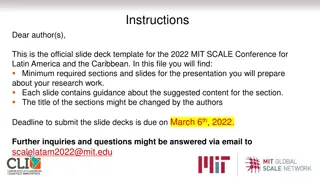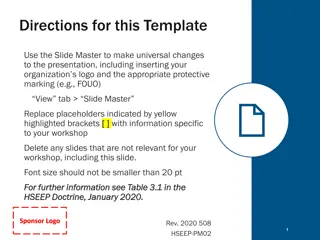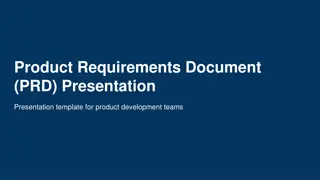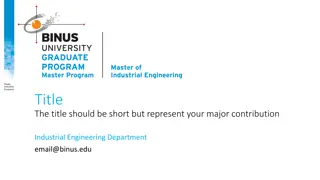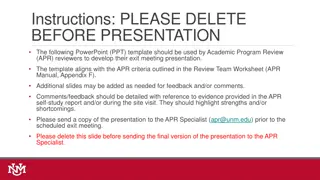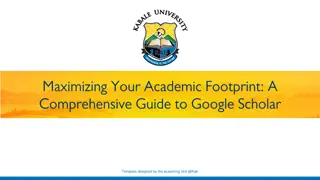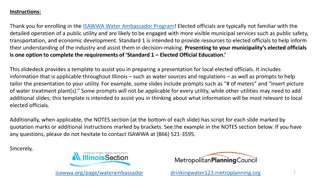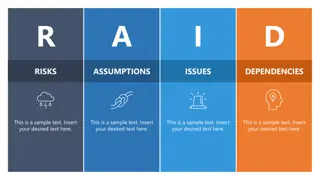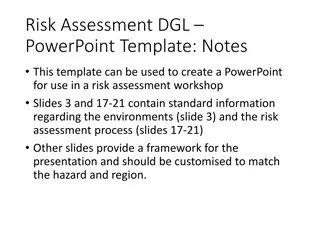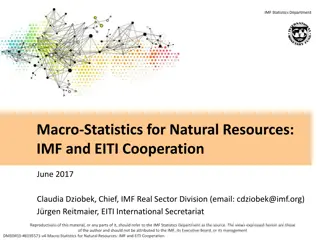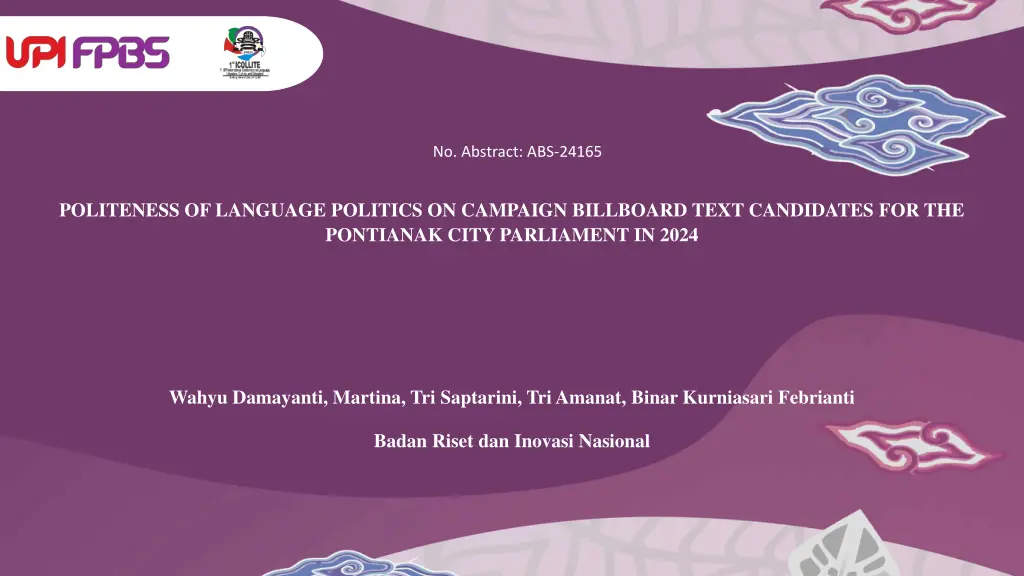
Analyzing Positive Politeness Strategies in Political Campaign Billboards
"Explore the use of positive politeness strategies in political campaign billboards for the 2024 Indonesian parliamentary elections in Pontianak City. Understand how language impacts public perceptions of candidates and influences effective political communication at the regional level."
Download Presentation

Please find below an Image/Link to download the presentation.
The content on the website is provided AS IS for your information and personal use only. It may not be sold, licensed, or shared on other websites without obtaining consent from the author. If you encounter any issues during the download, it is possible that the publisher has removed the file from their server.
You are allowed to download the files provided on this website for personal or commercial use, subject to the condition that they are used lawfully. All files are the property of their respective owners.
The content on the website is provided AS IS for your information and personal use only. It may not be sold, licensed, or shared on other websites without obtaining consent from the author.
E N D
Presentation Transcript
No. Abstract: ABS-24165 POLITENESS OF LANGUAGE POLITICS ON CAMPAIGN BILLBOARD TEXT CANDIDATES FOR THE PONTIANAK CITY PARLIAMENT IN 2024 Wahyu Damayanti, Martina, Tri Saptarini, Tri Amanat, Binar Kurniasari Febrianti Badan Riset dan Inovasi Nasional
INTRODUCTION The 2024 Indonesian parliamentary elections will feature fierce competition between political parties and candidates vying for public support. Language plays a crucial role in political communication, as it can influence public perceptions, attitudes, and enthusiasm towards candidates. Politeness in language, including the use of polite words, avoidance of offensive language, and constructive criticism, is fundamental for maintaining harmonious relationships and effective political communication. Political campaign media, such as billboards, are important channels for candidates to reach voters, build a positive image, and convey their vision and mission. This study focuses on analyzing the use of positive politeness strategies in the campaign billboard texts of candidates for the Pontianak City Regional Representative Council (DPRD) in the 2024 elections, providing a contemporary analysis of language use in Indonesian political communication at the regional level.
LITERATURE REVIEW The literature review discusses the importance of politeness in the language used on political campaign billboards to effectively convey messages to the audience. It examines pragmatic theory, which looks at how context influences the interpretation of meaning in language. The review covers Penelope Brown and Stephen Levinson's Politeness Theory, which focuses on how individuals try to maintain "face" (positive and negative) in social interactions. It outlines four main politeness strategies: Bald on record - direct, urgent messaging without consideration for face. Positive politeness - meeting the listener's need to be accepted and liked. Negative politeness - meeting the listener's need for freedom of action. Off-record - indirect messaging that allows the speaker to avoid responsibility. The review provides examples of how these politeness strategies can be applied in politica
METHOD This study used a qualitative descriptive research approach to describe and explain existing phenomena, focusing on the nature, quality, and relationships between activities. The data for the study consisted of the text content on campaign billboards of prospective city council (DPRD) members in Pontianak City. The researchers collected this data through documentation - gathering books, archives, documents, written images, and other information that could support the research. The data analysis involved several steps: Collecting data relevant to the research objective of examining the use of positive politeness strategies in the billboard texts. Classifying the data findings based on the types of positive politeness strategies identified. Interpreting the data. Drawing conclusions based on the findings and interpretations.
FINDING AND DISCUSSION The study examined the use of positive politeness strategies in political campaign billboards in Pontianak City, Indonesia. The researchers analyzed the billboard content of various city council (DPRD) candidates and identified the following politeness strategies: Bald on Record: This direct strategy was used by candidates to clearly state their vision and mission to serve the people, without any attempts to minimize threats to voters. For example: HADIR KERJA UNTUK RAKYAT Positive Politeness: Some candidates used a friendly, pleasant approach to appeal to voters, especially women, and strengthen social bonds. For example, one candidate addressed potential female voters as "beautiful moms" to appear more relatable. For example: AYOO!!! MAK-MAK CANTEK PILIH CALEG GANTENG Negative Politeness: Other candidates employed a more reserved, less imposing strategy, giving voters freedom of choice by stating they would represent all political party supporters. For Example: APAPUN PARTAI ANDA, SIAPAPUN CAPRES ANDA, UNTUK DPD PASTIKAN TETAP PILIHAN MARIA GORETI Off Record: Some billboards used more indirect, implicit messages to convey the candidate's vision for improving the city and region, along with cultural references like the regional greeting "Horas" to connect with the local community. For example: UNTUK PONTIANAK & KALBAR YANG LEBIH BAIK. The researchers found that the candidates utilized a range of politeness strategies in their billboard content to connect with and persuade voters, from the direct and authoritative to the more subtle and relationship-building approaches. These strategies reflect the candidates' efforts to navigate the political landscape and appeal to their constituents.
CONCLUSION This study examined the use of positive linguistic politeness strategies in the campaign billboard texts of Pontianak City Parliament candidates. The findings provide insights into how candidates use language to maintain politeness and professionalism in their campaign communications. The results show that adhering to cultural and societal values is crucial in crafting effective campaign materials. Candidates who demonstrate linguistic politeness, avoid offensive language, and deliver constructive criticism are more likely to create a positive public perception and gain voter support. The study contributes to understanding the importance of language use in the democratic process, particularly in local Indonesian elections. The conclusions can inform best practices for ethical and effective political campaigning, highlighting how language shapes the success of electoral campaigns. By focusing on the politeness of language in campaign materials, this research offers valuable insights to guide future political candidates in connecting with voters and promoting their vision effectively.
REFERENCES Alam, S. (2019). STRATEGY OF POLITICAL PARTY CAMPAIGN ON SOCIAL MEDIA (Case Study of Partai Soldaritas Indonesia in Criticizing the Indonesian Parliament Through YouTube). Iccd, 2(1), 494 499. https://doi.org/10.33068/iccd.vol2.iss1.196 Benu, N. N., Suryati, N. M., Simpen, I. W., & Denil, M. (2024). Language of Political Campaign: Unraveling the Linguistic Landscape in Billboard Advertisements. Journal of Language and Linguistics in Society, 42, 38 50. https://doi.org/10.55529/jlls.42.38.50 Brown, P., & Levinson, S. C. (1987). Politeness: Some universals in language usage. In Politeness: Some universals in language usage. (pp. xiv, 345 xiv, 345). Cambridge University Press. Dalimunte, A., & Wen, F. (2022). Shaping political image through politeness strategies in the presidential debates. JEES (Journal of English Educators Society), 7(1), 102 109. https://doi.org/10.21070/jees.v7i1.1660 Damayanti, W. (2020). Imperative Form Related to The Pandemic Covid-19 in Social Media: Linguistic Politeness Signs. Prosiding Seminar Nasional Linguistik Dan Sastra (SEMANTIKS), 560 568. https://jurnal.uns.ac.id/prosidingsemantiks Hadiwijaya, M. (2023). Discourse and Power: Persuasive Language in Indonesian Media. Verba (Journal of Applied Linguistics), 2(2023), 9 16. https://doi.org/10.572349/verba.v2i1.363 Haryanto, H., Indriani, N., Safar, M., Fansiska, F. W., & Dewi, D. U. (2024). The Use of Politeness Strategy and The Influence Factors in Political Talk Show. Surakarta English and Literature Journal, 7(1), 86 100. https://doi.org/10.52429/selju.v7i1.214 Hasjim, M., Maknun, T., & Suryaningsih, I. (2022). Implicature in Political Campaign for the Local Government Leader Elections of Province South Sulawesi Governor and Deputy Governor for the Period 2018 - 2023. Proceedings of the 9th Asbam International Conference (Archeology, History, & Culture In The Nature of Malay) (ASBAM 2021), 660(Asbam 2021), 734 739. https://doi.org/10.2991/assehr.k.220408.102 Heryono, H. H., Hamdani, D., & Purno Wahyu, A. (2024). Text as a Social Network Analysis Topography And Political Communication In Indonesia. Brilliance:




